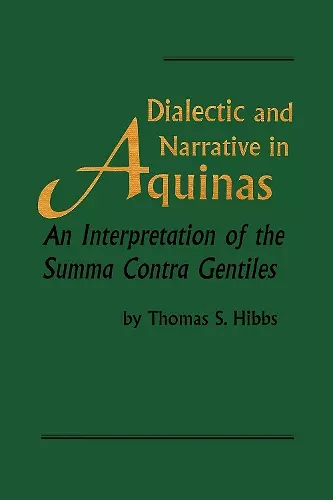Dialectic and Narrative in Aquinas
An Interpretation of the 'Summa Contra Gentiles'
Format:Hardback
Publisher:University of Notre Dame Press
Published:30th Jun '95
Currently unavailable, and unfortunately no date known when it will be back
This hardback is available in another edition too:
- Paperback£27.99(9780268031138)

Dialectic and Narrative in Aquinas investigates the intent, method, and structural unity of Thomas Aquinas's Summa Contra Gentiles. In this innovative study Thomas S. Hibbs goes against the grain of most traditional interpretations of the work, which claim it serves a missionary or apologetic end, and argues that the intended audience is Christian and that its subject is Christian wisdom. In the process of making his argument, Hibbs also demonstrates that the Summa Contra Gentiles is the most important of Aquinas's texts on the relationship between faith and reason, theology, and philosophy.
Since the prologue to the Summa Contra Gentiles has been the focus of nearly all the debates over the work, Hibbs begins with an examination of it and the controversies it has provoked, and tests various interpretations of the prologue in light of the actual text. He then goes on to suggest that the method of the Contra Gentiles is dialectical and that its unifying principle is provided by the narrative structure of scripture. The next chapters are devoted to each of the Contra Gentiles' four ports and Hibbs argues that any interpretation of the first three books must consider how the order of Aquinas's discussion is driven by a series of dialectical encounters with received opinions, especially those of Aristotle and his commentators. Hibbs further demonstrates how attention to the dialectical method of the work has two advantages: first, it enables readers to avoid misinterpretations of Aquinas's positions on various issues, and second, it allows the reader to recapture something of Aquinas's original pedagogical intent. Dialectic and Narrative in Aquinas also reveals how the dialectical method of the Contra Gentiles is crucial to Aquinas's project of subordinating philosophy to theology, and in the concluding chapter Hibbs considers in detail the narrative unity of the Contra Gentiles and brings themes from Aquinas into conversation with contemporary work in genre theory.
[A] provocative and engaging new study . . . " —The Review of Metaphysics
“[Hibbs] make[s] a signal contribution to the discussion of Thomas’s intellectual project by emphasizing the ‘narrative’ at least as much as the ‘dialectic’ and by writing with a view to chastising those who would neglect the former in preference for the latter.” —Religious Studies Review
"One does not find in this book still another effort to explain what Aquinas was really about in the SCG; instead [Hibbs] interprets the text in a way that remarkably imitates Aquinas's own cogitatio fidei, his thinking about the truth of Catholic faith. The result is so brilliantly accomplished that one is led to ponder whether Hibbs works here as a philosopher or as a theologian. Whatever the answer, he renders a tremendous service to the world of Roman Catholic theology." —Theological Studies
“Thomas Hibbs has produced the definitive book on Summa Contra Gentiles, a book destined to become a permanent part of Thomistic studies." —International Studies in Philosophy
ISBN: 9780268008789
Dimensions: 229mm x 152mm x 19mm
Weight: 549g
254 pages